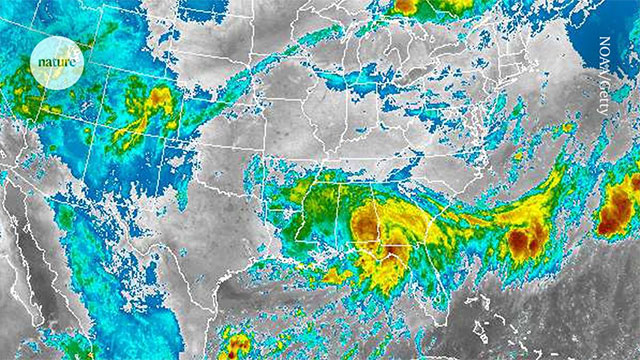Google AI can predict long-term climate and weather trends in just minutes
A computer model that combines conventional weather forecasting technology with a machine learning algorithm developed by Google recently showed superiority over conventional artificial intelligence (AI)-based tools in predicting predict weather scenarios and long-term climate trends.
This is the first machine learning model that can produce accurate overall weather forecasts – forecasts that cover a wide range of scenarios. The development of this model will open the door to forecasting that is faster, less energy-intensive than existing tools, and especially more detailed than approaches based solely on AI.
Current forecasting systems often rely on general circulation models (GCMs), which are programs based on the laws of physics to simulate various processes occurring in the Earth's oceans and atmosphere. , and predict how they might affect global weather and climate. The problem is that GCM requires a lot of computing power, up to terabytes or even petabytes of data, consuming a lot of resources and energy. Fortunately, advances in machine learning are starting to provide a more effective alternative.
There are already several machine learning forecasting models, such as Pangu-Weather (Huawei), and DeepMind's GraphCast. These models have the same level of accuracy as conventional GCMs for deterministic forecasting — the method of generating a single weather forecast. But GCMs are not reliable for ensemble forecasting or long-term climate prediction.
The problem with pure machine learning methods is that you only train it on the data it has already seen. The climate is constantly changing, bringing unprecedented facts, so machine learning models must also extrapolate into that unknown future. By incorporating physics into the model, scientists can ensure that algorithms can produce more accurate predictions.

'Hybrid model'
This is the idea behind the project to develop and train NeuralGCM, a model that combines 'aspects of traditional physics-based atmospheric solvers with some AI components'. Engineers have used this model to produce short- and long-term weather forecasts, as well as climate predictions. To evaluate the accuracy of NeuralGCM, the researchers compared the model's predictions with real-world data, as well as outputs from other models, including GCM and several models. Based entirely on machine learning.
Like current machine learning models, NeuralGCM can provide accurate, short-term weather forecasts – one to three days in advance – while consuming only a fraction of the power of GCM. Additionally, it also makes far fewer errors than other machine learning models when making long-term forecasts beyond seven days. In fact, NeuralGCM's long-term forecasts are similar to those produced by the ensemble model of the European Center for Medium-Range Weather Forecasts (ECMWF-ENS), which is a GCM widely considered The gold standard in weather forecasting.
The team also tested how well the model could predict different weather phenomena, such as tropical storms. They found that many pure machine learning models produced inconsistent and inaccurate predictions compared to both NeuralGCM and ECMWF-ENS. The researchers even compared NeuralGCM with ultra-high-resolution climate models called global storm resolution models. As a result, NeuralGCM can produce more realistic tropical storm numbers and trajectories in less time.
The team's upcoming goal is to further improve and tune the performance of NeuralGCM, mainly focusing on the atmospheric component to model the Earth system. This is probably the component that most directly affects the time period. daily period.